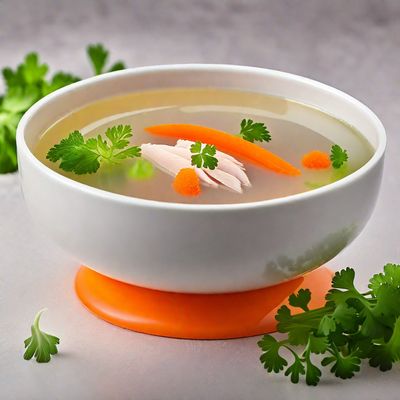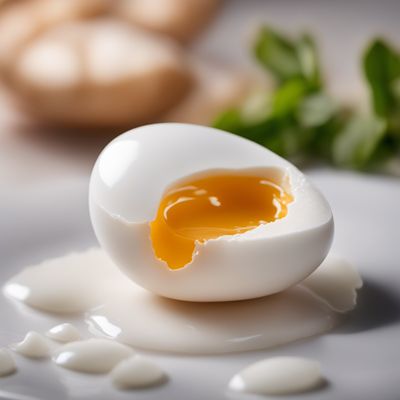
Ingredient
Egg powder
The Versatile Egg Alternative
Egg powder is made by dehydrating and pulverizing eggs, resulting in a fine powder that can be reconstituted with water. It possesses a neutral taste and a smooth texture, making it suitable for both sweet and savory recipes. Egg powder is a popular choice for individuals with dietary restrictions or allergies, as it provides a viable alternative to fresh eggs.
Origins and history
The production of egg powder dates back to the early 20th century when it was developed as a way to preserve eggs for longer periods. It gained popularity during World War II when fresh eggs were scarce. Today, egg powder is widely used in the food industry and by home cooks as a convenient and long-lasting egg substitute. It offers versatility in recipes and can be easily stored without refrigeration.
Nutritional information
Egg powder is a good source of protein, vitamins, and minerals. It is low in carbohydrates and fat, making it a suitable option for individuals following specific dietary plans. However, it is important to note that egg powder may not provide the same nutritional benefits as fresh eggs, as some nutrients may be lost during the dehydration process.
Allergens
Egg powder may contain allergens, such as eggs, which can trigger allergic reactions in individuals with egg allergies. It is important to read product labels and consult with healthcare professionals if you have any known allergies or dietary restrictions.
How to select
When selecting egg powder, look for reputable brands that offer high-quality products. Check the packaging for any signs of damage or tampering. Additionally, consider the intended use of the egg powder, as some brands may offer specific variations suitable for baking or cooking purposes.
Storage recommendations
To maintain the freshness and quality of egg powder, store it in a cool, dry place away from direct sunlight. Ensure that the container is tightly sealed to prevent moisture absorption. Follow the recommended storage guidelines provided by the manufacturer for optimal shelf life.
How to produce
Egg powder is produced through a specialized process that involves dehydrating and pulverizing eggs. This process removes the moisture content from the eggs, resulting in a powder that can be reconstituted with water. While it is not feasible for amateur cooks to produce egg powder at home, it is readily available for purchase in most grocery stores and online retailers.
Preparation tips
To reconstitute egg powder, mix the desired amount of powder with an equal amount of water. Stir well until the powder is fully dissolved. The reconstituted egg powder can be used as a substitute for fresh eggs in recipes, such as baking, batters, and custards. Adjust the amount of water and powder according to the specific recipe requirements. Experiment with different ratios to achieve the desired texture and consistency.
Culinary uses
Egg powder is commonly used as a substitute for fresh eggs in baking recipes, such as cakes, cookies, and bread. It can also be used to make omelets, scrambled eggs, and quiches. Additionally, egg powder is a popular ingredient in powdered drink mixes, protein bars, and other processed food products. Explore different recipes and experiment with egg powder to discover its versatility.
Availability
Egg powder is widely available in most regions and countries. It can be found in grocery stores, supermarkets, and online retailers. The availability may vary depending on the specific brand and product variation.
More ingredients from this category
Recipes using Egg powder » Browse all

Molecular Gastronomy Chicken Soup
The Molecular Elixir: Chicken Soup Reinvented

Korean Chinese Style Nasi Kerabu
Seoul-ful Blue Rice Bowl: A Fusion of Korean and Chinese Flavors

Monmouthshire Yōkan Delight
Welsh-inspired Yōkan Delight: A Fusion of Japanese and Monmouthshire Flavors

Foi Thong - A Note by Note Delight
Golden Threads of Flavor: A Note by Note Twist on Foi Thong

New York-Style Cheesecake
Big Apple Cheesecake

Beef & Broccoli with a Molecular Twist
Sous Vide Beef & Broccoli Spheres with Umami Foam

Molecular Gastronomy Dim Sum
Revolutionizing Dim Sum: Molecular Gastronomy Delights

Molecular Gastronomy Spring Rolls
Revolutionary Spring Rolls: A Molecular Twist on a Classic

Yōkan with Matcha Swirl
Matcha Delight: Yōkan with a Twist

Molecular Gastronomy Pho
Pho Reimagined: A Molecular Gastronomy Twist

Bavarian Tiramisù
Bavarian Dream Delight

Molecular Gastronomy Tapas
Revolutionizing Spanish Tapas with Molecular Gastronomy
